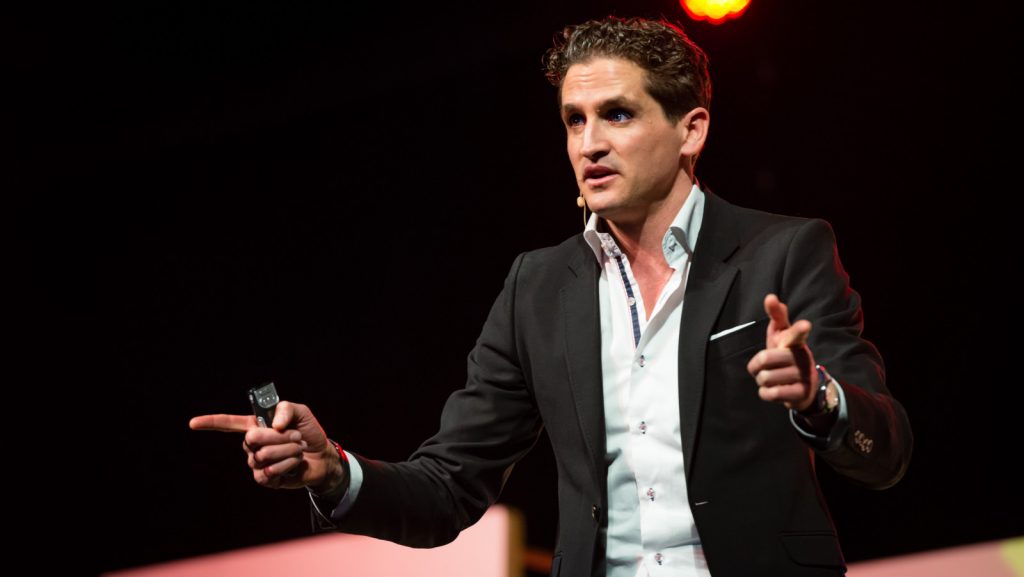Ventureburn is giving away three copies of the book to three lucky readers in South Africa. See footer of this story for more information.
In 2013, Kenyan fintech firm Mode won the IBM Global Entrepreneur of the Year award, having out-pitched startups from across the world.
No ad to show here.
The company’s CEO at the time Julian Kyula credited professional speaker, television host and author Justin Cohen (pictured above) for his crucial role in helping the company pitch and tell its story.
Cohen had been asked by IBM to help the company perfect its pitch for the competition. His work with the startup helped it win the semi-finals of the competition in Brazil, before it went on to win the finals in New York.
It’s not enough to have the best product, you’ve got to have the best pitch — Justin Cohen
In his latest book Pitch To Win, Cohen details a six-step formula which he used to train Mode, as well as other companies he has worked with over the years.
In this Q&A with Ventureburn, Cohen shares some tips on pitching, how he came about his six-step formula and some key learnings from the book.
How did you end up becoming an international speaker and expert on pitching?
I didn’t know the speaking profession existed, like many interesting careers, it’s not something they teach you about at school, but I was a passionate about personal development and had a message I wanted to share, so I started writing a book.
At the same time I worked as a producer on a business channel. I did a documentary on corporate training. That’s where I discovered that if you’ve got a useful message that you can share in an entertaining way, people will pay you.
An HR person I interviewed for the documentary asked if I knew of anyone who could do a motivational presentation at his company. “Sure”, I replied, “I can”.
That was the start of my speaking career. What I quickly realised was that having a great product or service is not enough, you have to have a great pitch. You have to be able to sell. I researched the field and came up with a six-step formula which exponentially increased my results.
Clients started to ask me to share it with them. Using the formula many of them brought in some major deals. That was when I decided to make it part of my offering.
My life mission is to equip and inspire people and organisations to realise their potential. If you can’t pitch your potential, you can’t realise your potential.
What motivated you to write this book?
Working my frustration out at the gym, it hit me, offering great value is not enough. It’s not enough to have the best product, you’ve got to have the best pitch.
That’s when I decided to figure out the keys to a great pitch. Once I did it for myself I began sharing it with others.
How exactly did come about the six-step winning formula in the book?
Research and experience. I attended more courses and read more books on the topic that I care to remember but it was applying it on myself and my clients that made me understand what truly worked.
What would you say are some of the key learnings on pitching you learnt?
She who listens most wins. The key to an effective pitch is identifying what your prospect really needs or wants. You need to tune in.
It takes 12 exposures to a new product or person before people will feel comfortable enough to buy. You need to be a rejection specialist. Don’t take it personally. Be willing to keep on keeping on.
Over 50% of the impact of your pitch is not what you say but how you say it.
Film yourself. Take note of your non-verbal communication, body language, facial expression and tone of voice. The number-one factor in a successful pitch is energy and enthusiasm. That is conveyed non-verbally but it also means you need to be driven by the difference you want to make in your customer’s lives.
Other than Mode, how many African startups have you coached?
Many of the people I work with ask me to sign non-disclosure agreements. Mode and EY were the two biggest that allowed me to publicise.
How different is the way African startups pitch compared to the way startups in Silicon Valley and around the world pitch?
The principles are the same. In my experience the six-step formula works universally.
What are some of the common mistakes you’ve seen African founders make while pitching?
The same mistakes that everyone makes, using facts rather than stories.
Stories are facts but they are facts with a soul. They make an emotional connection. People move emotionally before they move any other way.
Stories are case studies that demonstrate the value that you have to offer. They put us in a virtual reality machine allowing us to experience that value. Facts tell, stories sell.
Pitch To Win is available in bookstores across South Africa and in online stores like Amazon, Takealot and Exclusive Books.
Ventureburn is giving away three copies of the book to three lucky readers in South Africa. Simply email your responses to the following questions to enter the draw:
- What do you like most about Ventureburn?
- How do you think Ventureburn can better improve its coverage?
- What would you like to see more of on Ventureburn?
Featured image: Pitch To Win author Justin Cohen (Supplied)
